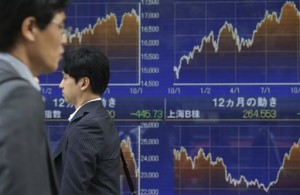
People walk by an electronic stock board of a securities firm in Tokyo on Oct. 10, 2014. Asian markets rose Wednesday, Oct. 15,with bargain-hunters providing some lift after recent losses while data showing Chinese inflation at a five-year low raised hopes for fresh economy-boosting measures from Beijing. AP PHOTO/KOJI SASAHARA
HONG KONG–Asian markets rose Wednesday, with bargain-hunters providing some lift after recent losses while data showing Chinese inflation at a five-year low raised hopes for fresh economy-boosting measures from Beijing.
US stocks came off a three-day sell-down to provide a positive lead thanks to some solid earnings reports, while the euro continued to struggle following another batch of soft German data.
Tokyo rallied 0.92 percent after five days of losses and helped by a weaker yen, with the Nikkei adding 137.01 points to 15,073.52.
Sydney gained 0.73 percent, or 38.2 points, to close at 5,245.6 with mining companies leading the charge on the back of stronger commodity prices.
Shanghai reversed initial losses to end 0.60 percent higher, adding 14.20 percent to 2,373.67 while Hong Kong climbed 0.40 percent, or 92.08 points, to 23,140.05.
Seoul lost 0.17 percent, or 3.34 points, to close at 1,925.91 as the Bank of Korea cut interest rates for the second time in three months and lowered its 2014 growth estimate for the country’s economy.
A slew of weak figures out of China, Japan and the eurozone have fanned worries about the global outlook and sent investors running for the door in recent weeks, despite the US economy showing healthy growth.
On Wednesday, Beijing said inflation in September eased to 1.6 percent–its lowest since January 2010–from 2.0 percent in August, indicating deflationary risks are rising in the world’s No. 2 economy.
The government also said the producer price index (PPI)–a measure of costs for goods at the factory gate and a leading indicator of the trend for CPI–fell 1.8 percent year on year. The last PPI increase was in January 2012, when it rose 0.7 percent.
German data knocks confidence
However, while the report is the latest suggesting problems in the Chinese economy, traders bet it will put pressure on the government to act to boost the economy.
“As China’s deflation risk rises, policy makers should take pre-emptive measures to reduce interest rates in the real economy,” HSBC economist Ma Xiaoping said, according to Dow Jones Newswires.
“Deflation is not happening now, but the risk is obviously rising. Policy makers should do more.”
Confidence has also been given a knock from disappointing figures out of Germany, including on factory orders, industrial production, and foreign trade. On Tuesday, a closely watched index of investor sentiment fell for the 10th straight month, to its lowest level since November 2012.
The news weighed on the euro, which bought $1.2657 in Tokyo, against $1.2659 in New York and well down from the 1.2700 earlier Tuesday in Asia. However, it rose to 135.72 yen from 135.62 yen.
The dollar was at 107.20 yen, up from 107.13 yen in New York.
New York’s three main indexes ended broadly higher following sold earnings from the likes of Citigroup, Wells Fargo and Johnson & Johnson.
The S&P 500 gained 0.16 percent and the Nasdaq climbed 0.32 percent, but the Dow edged down 0.04 percent.
World oil prices picked up after plummeting on Tuesday, although they were still down around a fifth from their 2014 highs. US benchmark West Texas Intermediate was up 20 cents at $82.04 a barrel in mid-morning trade, and Brent crude climbed 31 cents to $85.35.
Gold was at $1,224.00 an ounce against $1,233.25 late Tuesday.
In other markets:
— Taipei fell 1.29 percent, or 112.88 points, to 8,655.51.
Hon Hai shed 2.6 percent to Tw$93.5 while Taiwan Semiconductor Manufacturing Co. rose 0.41 percent to Tw$121.5.
— Wellington rose 0.33 percent, or 16.98 points, to 5,162.87.
Fletcher Building was up 1.4 percent at NZ$8.69 and Trade Me added 0.56 percent to NZ$3.60.
— Manila closed 0.65 percent higher, adding 45.13 points to 6,991.19.
Philippine Long Distance Telephone Co. added 1.72 percent to 3,074 pesos while Ayala Land rose 2.85 percent to 32.50 pesos.
— Kuala Lumpur fell 0.53 percent, or 9.54 points, to end at 1,786.84.
Malayan Banking shed 1.0 percent to 9.58 ringgit, while budget carrier AirAsia lost 0.9 percent to 2.33. Petronas Chemicals Group added 0.3 percent to 6.17 ringgit.
— Jakarta ended up 0.82 percent, or 40.36 points, at 4,962.94.
Bank Negara Indonesia gained 4.74 percent to 5,525 rupiah, while palm oil firm Astra Agro Lestari slipped 4.47 percent to 20,825 rupiah.
— Singapore rose 0.14 percent, or 4.32 points, to close at 3,198.72.
Singapore Telecom fell 0.27 percent to end at Sg$3.70 and Singapore Airlines finished 0.83 percent higher at Sg$9.69.
— Bangkok closed flat, edging up 0.04 percent or 0.63 points to 1,547.41.
Bangchak Petroleum lost 2.99 percent to 32.50 baht, while Charoen Pokphand Foods gained 2.33 percent to 33 baht.
— Mumbai was closed due to elections.